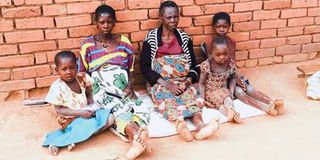More cheers as Nyasa women turn to contraceptives

Osmunda Nombo (second left) with her mother,Maria Simba (center) and her children. Osmunda has four children with three different men and is expecting another child. Photo |Stella Barozi
What you need to know:
Agnes Miale, a petty trader in Mbamba Bay, dropped out of form three in 2005 when she was three months pregnant. An on-and-off relationship with the father of that baby left her with two more children before he left for good when the last one was an infant. That’s when she decided to use Implanon, an implant that can prevent pregnancy for up to three years.
Using contraception to limit and space their children is becoming a popular strategy in Nyasa, where many women raise their families singlehandedly, with little, if any, support from a husband or male partner.
Agnes Miale, a petty trader in Mbamba Bay, dropped out of form three in 2005 when she was three months pregnant. An on-and-off relationship with the father of that baby left her with two more children before he left for good when the last one was an infant. That’s when she decided to use Implanon, an implant that can prevent pregnancy for up to three years.
“I want my children to grow first before I decide to have another child,” she said. “I want to provide them with an education.”
Stamili Rashid was 21 when she delivered her fourth baby boy and, though she still wanted to have a daughter, she decided to start using contraception so that she could wait until the boys were older.
“Taking good care of the babies used to be a problem before I started using contraceptives,” she said. “I would get pregnant when the children were still young and when they still needed my attention.”
She, like many of the women here, learned about the benefits of limiting the number and spacing of their children at Mbamba Bay health centre. Anna Mputa, the nurse in charge of the care and treatment centre, says more women are seeking family planning services, possibly because single motherhood is the norm here.
Fortunately, contraceptives are always available and are provided free of charge.
Child abandonment
Likwilu village Chairman Leslie Kadambe says child abandonment is common. He says women get involved with different men at different times, hoping to find a permanent partner, but most men are not ready to raise other men’s children. That leaves women with more children to take care of on their own.
Douglas Rwambo, the District Community Development Officer, says his office receives many cases of family abandonment.
“Because there is no marriage commitment here, child abandonment is very high. Many children lack parental care because parents bear many children with different partners,” he says.
Since Nyasa became a district two years ago after it split from Mbinga, his office has handled 42 cases of family abandonment. “This is a big problem and most women don’t report the matter for fear of exposing their partners,” reads a community development department report in part. According to the report, 1,365 (31.46%) children have been abandoned, 82 families are headed by children and 32 children live on the streets.
Nyasa district has a fertility rate of 4 children, according to the 2012 Housing and Population Census. An estimated 44 percent of women in the district use modern methods of contraception, according to Dr John Papalika, acting District Executive Director of Nyasa who is also the District Medical Officer.
“There is a big relationship between poverty and large families,” Dr Papalika says. “People who are poor take a certain pride in the size of their brood regardless of their economic condition. They may not have proper housing or enough food but tend to reproduce every year.”
Indeed, the 2010 Demographic and Health Survey in Tanzania, the most recent one conducted, shows that fertility rates are highest among the poorest people. Among the poorest one-fifth of the population, the fertility rate is 7 children per woman and the fertility rate among the richest quintile is about three children.
Large families and poverty
Also, in the wealthiest quintile, nearly 85 per cent of children have been fully immunized, compared with 69 per cent in the poorest quintile, and the rates of stunting and underweight for these children are the lowest in the country – 26 per cent stunted compared with 48 per cent, and 9 per cent underweight compared with 22 per cent.
Veronica Chekani, 21, had come to the clinic to have her Implanon removed when we met. Inserted two years ago, the implants had slightly moved from where they were inserted and she wanted them removed. This time, she would try the injection.
She has two children by different men, and lives with her grandfather but mostly takes care of the children alone. Her children’s fathers have to be forced to provide support for their children.
The petty trader dropped out of secondary school when she was in form one due to pregnancy. The man responsible was ready to marry her but ran away when her parents took the matter to court.
Veronica says most of her friends have children and they too are on family planning. She says today women in Nyasa are having fewer children than was the case in the past.
“Today women are having at least four children unlike in the past where they used to have up to seven children. Others are having as less as three and opting for tubal ligation,” she says.
Women want to have a number of children they can take care of. Children they can be able to send to school. Because they have too many children and are poor, some parents cannot afford to send their children to school.
Dr Papalika thinks illiteracy is to blame here. He says people don’t see the importance of education.
Margareth Mafitam, District Secondary Education Officer concurs. She says education awareness is limited. Despite being poor, some parents don’t consider their children’s education a priority.
Margareth’s office receives parents asking for assistance to take their children to secondary school. Despite the fact that school fees in public schools is cheap, at Shs 20,000 a year and can be paid in installments, many parents struggle to raise the amount.
Cohabiting culture
Margareth cites the cohabiting culture as the source of poverty.
“Because they have children with different partners, people end up with large families and little or no income at all. This affects the children since parents can not afford to send them to school.”
Nangombo Parish Priest, Fr Erasmo Mhagama concedes very few couples are officially married in Nyasa. He wedded only nine couples last year, a number he says is very small compared to the number of believers. Out of the 5,600 Catholic believers, over 2,000 couples are cohabiting.
“People fear to wed in church because marriages here don’t last. They fear to commit themselves in church because separating would be difficult,” says the priest.
Even when they go to court for a divorce, couples are usually advised to take the matter to church.
But why don’t the marriages last? Fr Mhagama sites polygamy as one of the reasons. The Matengo who live in the highlands marry many wives as a way of getting cheap labour to work in the coffee farms. He says three quarters of men there are polygamists, regardless of where they got married. This sometimes leads to official wives calling it quits.
Sheikh Zubery Mzee of Mbamba Bay ward weds four to five couples instead of 10-15 in a year. He believes marriages don’t last because they lack God’s blessing.
“The reason men don’t settle with a single partner is because girls are usually not faithful,” says Sheikh Zubery.
Nyasa District Commissioner, Margaret Malenga calls upon women to stop having children with different men. She says when things don’t work with the first partner, women should move on and find other means of making a living rather than trying their luck with another partner, a tendency that is likely to leave them with more children to take care of.
“Women should change their mindset and stop having children with more than one partner. They should instead engage in income generating activities and life will be easier if they have an income and a few mouths to feed,” says the DC.
Email: [email protected]




